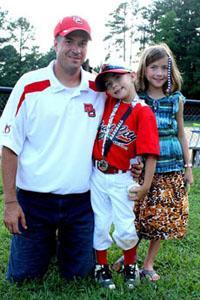Meet EPA Engineer Shawn Ryan, Ph.D.

Homeland Security and the Art of Decontamination
Shawn P. Ryan, Ph.D. is a chemical engineer at EPA's National Homeland Security Research Center. He has worked at EPA for 12 years, nine of which have been devoted to leading research to support decontamination and consequence management. His expertise includes process engineering, reaction kinetics, and environmental engineering.
How does your science matter?
My research prepares EPA to better respond to a chemical, biological or radiological incident. If a chemical or biological agent is released, intentionally or unintentionally, how will we clean it up? How will we deal with the aftermath and get life back to normal? We are trying to understand those threats and improve on ways to mitigate them.
One project, the Bio-response Operational Testing and Evaluation project (BOTE), puts our research into practice by taking what we’ve learned since the 2001 anthrax attacks and using it in the field. We contaminated a test facility at Idaho National Labs with a harmless anthrax surrogate that, in terms of decontamination, would simulate anthrax spores, and then we practiced decontamination. We worked with over 300 participants, including EPA on-scene coordinators from around the United States, the Department of Defense, civil support teams that may be called in to help in such an incident, the Center for Disease Control and Prevention, the Federal Bureau of Investigation, and the Department of Homeland Security, so it really simulated a large-scale response and got a lot of people involved.
- Interagency Collaboration Tests Response to Anthrax Contamination
- Amerithrax or Anthrax Investigation
Decontamination challenges are much greater in the field than in the lab. Research projects like BOTE help us understand the pros and cons of different decontamination methods. Now we can apply what we learned when picking an approach for cleaning up the next real incident.
What do you like most about your research?
I like that I can see the immediate impact of the research. On a daily basis my colleagues and I get the opportunity to work with people who are implementing our research and the tools that we’re developing. We work together from the beginning to understand the problem, come up with potential solutions, and then do the research to help reach a solution.
A recent example came with the letters containing ricin that were sent to a Congress member and President Obama earlier this year. We were called and asked what we had that could decontaminate a mail sorter in Washington, DC without ruining it. We were also called when investigators found the house where the suspect who was mailing the letters lived. Again they asked us what was the best method to decontaminate the house and how might the sampling be impacted by the decontamination method that they chose.
To see the research being applied and have the people who are cleaning it up come back and ask us our opinion based on our research, it is really gratifying.

When did you first know you wanted to be a scientist?
I’ve been interested in science since my 9th grade earth science class. It was the first time I got to do experiments and see that I could learn different things about the world through experiments.
If you could have dinner with any scientist, past or present, who would you choose and what would you like to ask them?
I would pick Benjamin Franklin because I admire how he learned through observation and developed solutions to personal problems he faced. For example, when he was getting older he started having problems with his vision, both seeing things far away and up close. So instead of switching between two pairs of glasses, he invented bifocals so he could see everything at once.
I’d ask him, what problems did he see that he couldn’t solve, and why not? I would like to know how he dealt with not being able to solve the problem. I would also like to ask him how he balanced science and politics. Did he consider himself a scientist in politics or a politician with a passion for science? Working as a scientist in the federal government, I feel like there is a lot that I could learn from his experience.
Tell us about your background.
I graduated from Rensselaer Polytechnic Institute, or RPI, in Troy, NY with a bachelor’s of science degree in Environmental Engineering. I stayed at RPI to get my PhD in Chemical Engineering.
If you were not a scientist, what would you be doing?
That's an easy one! I would be coaching baseball or basketball.
Any advice for students considering a career in science?
The biggest thing you gain from school is how to learn. You can’t ever forget that. No matter what I do, I never feel like I’m an expert at it. I feel like I know a little and there is still a lot to learn. I constantly have to remember how to apply different tools that I’ve acquired over the years to solve problems. That is key for students to really pay attention to, how to use the resources that they have to solve problems and to remember that it’s something they will use for the rest of their lives.
